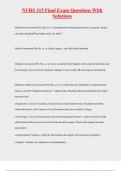NURS 315 Final Exam Questions With
Solutions
Medications assessment Pre-Op Antidepressants effecting anesthesia, coumadin, aspirin,
can effect bleedingWhat might need to be held??
Herbal Assessment Pre-Op Garlic, ginger - can effect blood thinning
Allergies Assessment Pre-Op Latex; ask about what happens when exposed and make sure
its an allergyo If you find out a patient is allergic to latex notify OR and surgeon immediately
Medical Conditions Assessment Pre-Op o Cardiovascular: Dysarthria, Congenital heart
disease, clots/DVT (higher cholesterol = higher risks), bleeding (takes blood thinner previously
increases risk)
o Respiratory: Listen for crackles, if patient has crackles further assess the patient and then
contact the doctor with evidence of why the patient may have crackles in lungs
o Neurologic: Loss of consciousness, Increased Intracranial Pressure - need to watch for older
adults because they are more at risk for delirium after surgery. Check and compare baseline
assessments
o Genitourinary: Kidneys, watch the labs (intake and output), test women for pregnancy
o Hepatic: Alcohol use, albumin level (malnutrition)
, NURS 315 Final Exam Questions With
Solutions
o Integumentary: Color (circulation), Skin breakdown (pressure ulcers)
o Musculoskeletal: Anything that interferes with positioning of the patient (osteoporosis,
arthritis, low ROM, etc)
o Endocrine: Check glucose levels and follow hospital protocol about whether or not patients
with diabetes will receive insulin or not before surgery
o Immune system: Patient on antibiotics CANNOT go to surgery-Assess for smoking history,
obesity, etc. What things could effect the surgery??
Pre-Op Meds Benzodiazepines [diazepam (Valium), lorazepam(Ativan), midazolam
(Versed)] - sedation, amnesia
Opioids (morphine, fentanyl) - for pain Histamine(H2)-receptor antagonists [famotidine
(Pepcid),ranitidine (Zantac)] - reduce acid secretion
Antiemetics [metoclopramide(Reglan), ondansetron(Zofran)] - increase gastric emptying,
prevent nausea &vomit
Anticholinergics (Atropine) - reduce oral and respiratory secretions, decrease the risk of
bradycardia
Antibiotics, antidiabetics, antihypertensive
Circulating Nurse NONSTERILE
, NURS 315 Final Exam Questions With
Solutions
Helps prep room, Maintains aseptic technique, Checks mechanical and electrical equipment and
environmental factors, Conducts preprocedural verification process, Confirms informed consent,
Assesses patients physical and emotional status, Plans and coordinates intraoperative nursing
care, Helps with applying monitoring devices and insertion of invasive lines and other devices,
Assists with and ensure patient safety with transferring and positioning, Aids with anesthesia
induction, Monitors draping, Records intraoperative care, Does labs, Does meds, Works with
scrubbed personnel to keep correct count of sponges, needles, instruments and medical devices,
Facilitates patient transfer to PACU, Gives hand-off report to PACU
Scrub Nurse STERILE activities = Preps OR, Gowns and gloves self and others, Prepares
surgical instruments, Assists with draping, Passes instruments and assists surgeon, Keeps correct
count of all instruments, Monitors aseptic technique, Keeps track of irrigation solutions, Accepts,
verifies, and reports drugs used by surgeon
Both circulating and scrub Takes part in surgical time-out procedure, Monitors aseptic
technique
General Anesthesia Loss of sensation and consciousness, possible impaired ventilatory
and cardiovascular function
, NURS 315 Final Exam Questions With
Solutions
Regional and Local Anesthesia Loss of sensation without loss of consciousness (numbing
at the dentist) - only one where patient DO NOT LOSE CONSCIOUSNESS
Monitored anesthesia care (MAC) Similar to general anesthesia, no inhalation agents,
patients less responsive and may require airway management. ACP needs to be there and perform
this because can transition into general anesthesia - colonoscopy
Moderate sedation (conscious sedation) Patient maintains own airway and cardiovascular
function, responds to verbal commands - no ACP required, nurse can administer these meds
under the physician
Malignant Hyperthermia · Rare metabolic disease, hereditary (50% chance). Can result in
muscle rigidity (way to identify it) (muscle becomes strong, tight, spasms, etc), hyperthermia
(high temp), hyperkalemia, hypercarbia, dysrhythmia, cardiac arrest and death
o Action: Administration of Dantrolene (Dantrium) IV
BP fluctuation Post-Op BP is going from 100/70 to 170/100
· Call doctor




